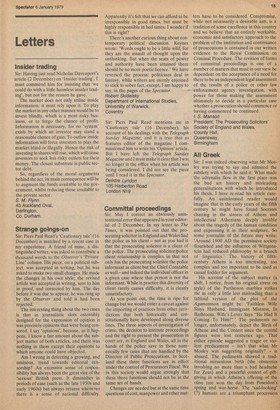Strange goings-on
Sir: Piers Paul Read's 'Cautionary tale' (16 December) is matched by a recent case in my experience. A friend of mine, a distinguished writer, was asked to contribute a thousand words to the Observer's 'Private Line' column. His piece, on a political subject, was accepted in writing, but he was asked to make two small changes. He made the changes in his own style; the revised article was accepted in writing, sent to him in proof, and corrected by him. The day before it was due to appear, he was rung up by the Observer and told it had been rejected.
The interesting thing about the two cases is that in journalistic slots ostensibly designed for the expression of opinion it was precisely opinions that were being censored. I say 'opinions', because, as it happens, I know a fair amount about the subject matter of both articles, and there was nothing in them except their opinions to which anyone could have objected.
Am I wrong in detecting a growing, and ominous, trend towards editorial censorship? An excessive sense of responsibility has always been the great vice of the 'serious' British press. It diminishes in periods of ease (such as the late 1950s and early 1960s) but always returns whenever there is a sense of national difficulty. Apparently it's felt that we can afford to be irresponsible in good times, but must be highly responsible in bad times. I wonder if this is right?
There's another curious thing about contemporary political discussion. Keynes wrote: 'Words ought to be a little wild, for they are the assault of thought upon the unthinking. But when the seats of power and authority have been attained there should be no more poetic licence.' We have reversed the process: politicians deal in fantasy, while writers are sternly enjoined to stick to sober fact, except, I am happy to say, in the pages of the Spectator.
Robert Skide'sky Department of International Studies, University of Warwick, Coventry Sir: Piers Paul Read mentions me in 'Cautionary tale' (16 December), his account of his dealings with the Telegraph Sunday Magazine, and it is true that as features editor of the magazine I commissioned him to write his 'Opinion' article. But I have left the Telegraph Sunday Magazine and I must make it clear that I was no longer in the office when his article was being considered. I did not see the piece until I read it in the Spectator.
Deirdre Lyndon 105 Netherton Road London N19






























 Previous page
Previous page